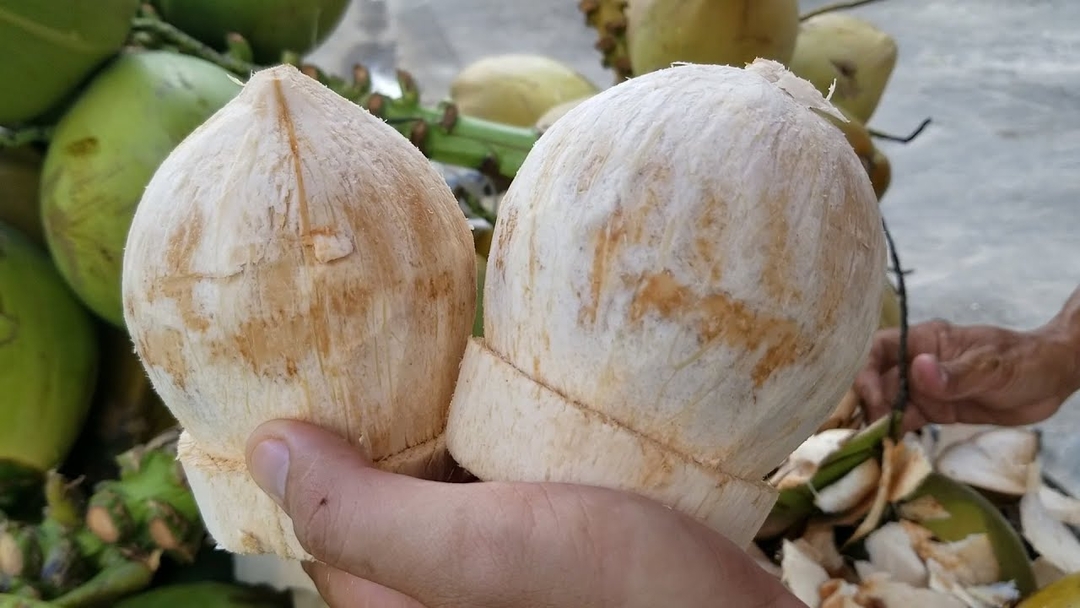May 21, 2025 | 04:46 GMT +7
May 21, 2025 | 04:46 GMT +7
Hotline: 0913.378.918
May 21, 2025 | 04:46 GMT +7
Hotline: 0913.378.918

The Mekong Delta accounts for approximately 80% of the country's coconut production area. The major coconut-growing provinces include Ben Tre, Tra Vinh, Tien Giang and Vinh Long.
The Plant Protection Department, Ministry of Agriculture and Rural Development (PPD-MARD) has just received the draft pest risk assessment concerning the importation of fresh immature coconut (Cocos nucifera L.) from Viet Nam into the United States for consumption from the Animal and Plant Health Inspection Service, United States Department of Agriculture (USDA).
According to analysis, Vietnam's fresh coconut is currently not licensed to be imported into the United States. Fresh coconuts thus need to undergo a pest risk inspection to be considered qualified. To be more specific, the export item must be fresh immature coconut. Rotten or fallen fruit are to be discarded in the field. Immature coconut fruit has a green husk that turns brown at peak maturity. Regarding post-harvest treatment, fresh immature coconut needs to be removed at least 75% of the outermost layer (exocarp) and trimming of the husk (mesocarp), resulting in the final marketable product.
The US side also identified 43 species of pests on coconut trees, including 1 spider species, 39 insect species, 1 snail species, 1 bacteria species and 1 nematode species. However, according to the results of the pest risk assessment, no species is likely to follow fresh immature coconuts exported from Vietnam to the USA. The Plant Protection Department and the US Animal and Plant Health Inspection Service will continue to exchange and negotiate to select appropriate phytosanitary measures and minimize the risk of pests.
On February 8, the Plant Protection Department sent an official dispatch to the Departments of Agriculture and Rural Development of the provinces and cities that grow coconuts, coconut production, processing and export enterprises and related units to contribute ideas concerning the US draft.
"In order to soon export Vietnam's coconut to the US market and ensure favorable and easy-to-deploy coconut export conditions, the Plant Protection Department proposes organizations and individuals to have comments and send to the Department of Agriculture and Rural Development before February 20", the official dispatch stated.
At the beginning of 2022, many exporters complained that it was difficult to export fresh coconuts to the United States. Previously, the country agreed to just remove the green skin and leave the white skin, but now the USA has changed the rules once again. The Plant Protection Department has rushed to complete and submit a technical dossier, requesting the United States to license the export of fresh shelled coconuts from Vietnam.
Based on the market opening document of the PPD, together with scientific documents and the phytosanitary database at Vietnam’s border gates, USDA issued the Draft Pest Risk Assessment Results for Fresh Coconuts on 1/2/2023. This is an important step for Vietnamese fresh coconuts to return to this potential market.
At the recent meeting between Deputy Minister of Agriculture and Rural Development Phung Duc Tien and Mr. Ralph Bean, Agricultural Counselor of the US Embassy, the leader of the agricultural sector mentioned the issue of market opening.
Apart from the USA’s strong livestock products such as poultry, beef and pork, Vietnam has also allowed the USA to export 171 types of plant seeds, 1 fresh tuber (potato), 12 types of grasses and grass seeds, grass cuttings, sorghum seeds, and 7 types of fresh fruit. Vietnam has submitted two more dossiers for passion fruit and coconut. Deputy Minister Phung Duc Tien hoped that the US side would speed up the progress and help Vietnam in the process of completing market access procedures for these fruits.
Translated by Samuel Pham

(VAN) In 2024, over 295 million people across 53 countries and territories faced acute hunger—an increase of almost 14 million people compared to 2023, while the number of people facing catastrophic levels of hunger reached a record high.

(VAN) World Environment Day 2025 (June 5) carries the theme 'Beat Plastic Pollution' continuing to emphasize the global urgency of addressing the plastic waste crisis.

(VAN) This was the assessment shared by experts at the workshop titled 'Assessing the Role and Potential of Low-Emission Rice Production Systems in Vietnam,' held on the morning of May 19.

(VAN) Cai Rong Port is the fisheries control center of Quang Ninh, helping to monitor fishing vessels, combat IUU fishing, and remove the EC's 'yellow card'.

(VAN) The German Agricultural Society (DLG) explores the possibility of establishing a mechanization service center in Vietnam’s Mekong Delta to support farmers in accessing and utilizing advanced machinery.

(VAN) On May 16, the Department of Water Resources Management, in collaboration with the Food and Agriculture Organization of the United Nations (FAO), held a signing ceremony for the GEF-8 project document.

(VAN) Food safety, mechanization, vocational training, and market opening are key areas of cooperation expected between the Vietnamese Government and the Federal Republic of Germany.